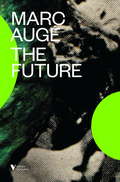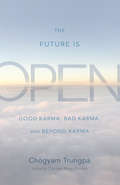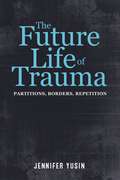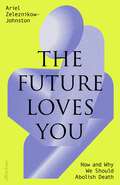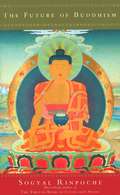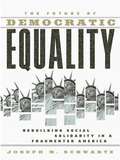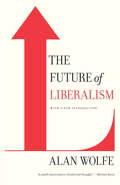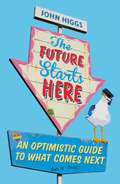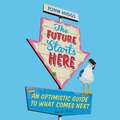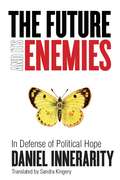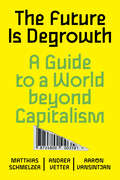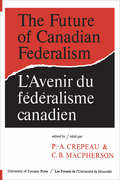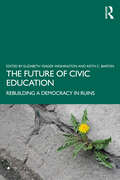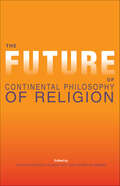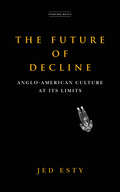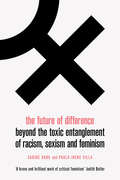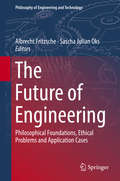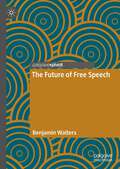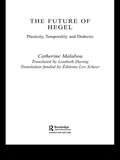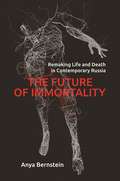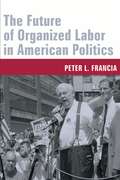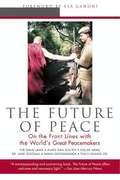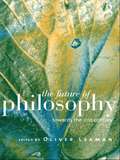- Table View
- List View
The Future
by John Howe Marc AugeFor Marc Augé, best-selling author of Non-Places, the prevailing idea of "the Future" rests on our present fears of the contemporary world. It is to the future that we look for redemption and progress; but it is also where we project our personal and apocalyptic anxieties. By questioning notions of certainty, truth, and totality, Augé finds ways to separate the future from our eternal, terrified present and liberates the mind to allow it to conceptualize our possible futures afresh.From the Trade Paperback edition.
The Future Is Open: Good Karma, Bad Karma, and Beyond Karma
by Carolyn Rose Gimian Chogyam TrungpaRenowned meditation master Chögyam Trungpa challenges popular misconceptions of the Buddhist doctrines of karma and rebirth, in the process showing how to step beyond karma on the path to awakening.Karma has become a popular term in the West, often connected with somewhat naive or deterministic ideas of rebirth and reincarnation or equated with views of morality and guilt. Chögyam Trungpa unpacks this intriguing but misunderstood topic. He viewed an understanding of karma as good news, showing us that liberation is possible and that the future is never predetermined. His unique approach to presenting the Buddhist teachings lends itself to an insightful and profound view of karma, its cause and effects, and how to cut the root of karma itself.
The Future Life of Trauma: Partitions, Borders, Repetition
by Jennifer YusinThe Future Life of Trauma elaborates a transformation in the concepts of trauma and event by situating a groundbreaking encounter between psychoanalytic and postcolonial discourse. Proceeding from the formation of psychical life as presented in the Freudian metapsychology, it thinks anew the relation between temporality and traumatized subjectivity, demonstrating how the psychic event, as a traumatic event, is a material reality that alters the character of the structure of repetition.By examining the role of borders in the history of the 1947 partition of British India and the politics of memorialization in postgenocide Rwanda, The Future Life of Trauma brings to light the implications of trauma as a material event in contemporary nation-formation, sovereignty, and geopolitical violence. In showing how the form of the psyche changes in the encounter, it presents a challenge to the category of difference in the condition of identity, resulting in the formation of a concept of life that elaborates a new relation to destruction and finitude by asserting its power to transform itself.
The Future Loves You: How and Why We Should Abolish Death
by Dr Ariel Zeleznikow-JohnstonA brilliant young neuroscientist explains how to preserve our minds indefinitely, enabling future generations to choose to revive usJust as surgeons once believed pain was good for their patients, some argue today that death brings meaning to life. But given humans rarely live beyond a century – even while certain whales can thrive for over two hundred years – it’s hard not to see our biological limits as profoundly unfair. No wonder then that most people nearing death wish they still had more time.Yet, with ever-advancing science, will the ends of our lives always loom so close? For from ventilators to brain implants, modern medicine has been blurring what it means to die. In a lucid synthesis of current neuroscientific thinking, Zeleznikow-Johnston explains that death is no longer the loss of heartbeat or breath, but of personal identity – that the core of our identities is our minds, and that our minds are encoded in the structure of our brains. On this basis, he explores how recently invented brain preservation techniques now offer us all the chance of preserving our minds to enable our future revival.Whether they fought for justice or cured diseases, we are grateful to those of our ancestors who helped craft a kinder world – yet they cannot enjoy the fruits of the civilization they helped build. But if we work together to create a better future for our own descendants, we may even have the chance to live in it. Because, should we succeed, then just maybe, the future will love us enough to bring us back and share their world with us.
The Future Of Buddhism
by Sogyal RinpocheIn this fascinating collection of articles, Sogyal Rinpoche, author of The Tibetan Book of Living and Dying, draws on his experience of twenty-five years of teaching in the West. In The Future of Buddhism, he reflects on some of the vital issues facing Buddhism in the modern world, issues such as adaptation, training, integration and the support of the sangha. He highlights the role of mind in health in The Spiritual Heart of Tibetan Medicine, delving into the practices of 'lojong' - training the mind - and meditation, and the ultimate healing that comes through recognizing the nature of mind. Finally, Rinpoche gives advice on how to survive the spiritual path in View and Wrong View and Misunderstandings. For when we follow a spiritual path, it is more important than ever to see through the mind and its delusions, and to know just how misunderstandings can come to dominate our lives.
The Future Of Democratic Equality: Rebuilding Social Solidarity in a Fragmented America
by Joseph M. Schwartz2011 David Easton Award, presented for the best book by the Foundations of Political Theory section of APSA: "The Future of Democratic Equality, by Joseph Schwartz, takes on three tasks, and accomplishes all brilliantly. Any one of these tasks well fulfilled would have been a laudable achievement. First, Schwartz argues for the centrality of the question of equality to democratic politics. Second, he critically analyzes and explains the shocking rise in inequality in the United States over the last three decades. This he does with conceptual clarity, rich interdisciplinary analysis, and a thorough examination of hard socioeconomic data. Third, he assails the near absence of concern for this soaring inequality among contemporary political theorists, and offers a cogent, and stinging, explanation that takes to task the discipline’s preoccupation with difference and identity severed from the pragmatics of democratic equality. The Future of Democratic Equality is a courageous and disciplined effort to tackle a hugely important political problem and intellectual puzzle. It well embodies the spirit of the Easton Book Award by providing well-grounded normative theory targeted to an urgent matter of contemporary concern. It is a must read for anyone who cares about democracy." - Respectfully submitted by Leslie Paul Thiele, University of Florida (chair) and Cary J. Nederman, Texas A&M University Why has contemporary radical political theory remained virtually silent about the stunning rise in inequality in the United States over the past thirty years? Schwartz contends that since the 1980s, most radical theorists shifted their focus away from interrogating social inequality to criticizing the liberal and radical tradition for being inattentive to the role of difference and identity within social life. This critique brought more awareness of the relative autonomy of gender, racial, and sexual oppression. But, as Schwartz argues, it also led many theorists to forget that if difference is institutionalized on a terrain of radical economic inequality, unjust inequalities in social and political power will inevitably persist. Schwartz cautions against a new radical theoretical orthodoxy: that "universal" norms such as equality and solidarity are inherently repressive and homogenizing, whereas particular norms and identities are truly emancipatory. Reducing inequality among Americans, as well as globally, will take a high level of social solidarity--a level far from today's fragmented politics. In focusing the left's attention on the need to reconstruct a governing model that speaks to the aspirations of the majority, Schwartz provocatively applies this vision to such real world political issues as welfare reform, race relations, childcare, and the democratic regulation of the global economy.
The Future Of Liberalism
by Alan WolfeOne of America's leading scholars offers a compelling exploration and defense of liberalism: what it actually is, why it is relevant today, and how it can help society chart a forward course.
The Future Starts Here: An Optimistic Guide to What Comes Next
by John HiggsWhen we look into the future, we imagine economic collapse, environmental disaster and the zombie apocalypse. But what if we are wrong? John Higgs takes us on a journey past the technological hype and headlines to discover why we shouldn't trust the predictions of science fiction, why nature is not as helpless as we assume and why purpose can never be automated. In the process, we will come to a better understanding of what lies ahead and how, despite everything we can build a better future.
The Future Starts Here: An Optimistic Guide to What Comes Next
by John HiggsAt some point in the 1980s we gave up on the future. Before then, we imagined wonderful days to come, free from disease, work and want, in television series like Star Trek or events such as the 1939 Futurama World Fair. When we look ahead now, we tell dystopian stories of environmental collapse, zombie plagues and the end of civilisation. If it is true that we have to imagine the future before we build it, then this is deeply worrying.There are of course good reasons for this bleak outlook. Serious environmental and societal problems are building, most notably climate change, inequality and population demographics. These will be accompanied by technological advances, including artificial intelligence and biotechnology, which will amplify the rate of change and make the future increasingly unstable and unpredictable.But it is not just technology that is changing. We are changing too. The postmodern world is evolving into a metamodern one. In the metamodern world concepts previously shunned, such as meaning, purpose and sincerity, return not as absolute truths but as necessary tools. While the postmodern world view was detached, cynical and frequently pessimistic, the metamodern is naturally more optimistic. If we engage with the problems of the world, we can overcome them. John Higgs takes us on a journey to find the individuals who are engaging with the changes that are coming, and through that engagement finding their own sense of purpose. As a result, the characters we meet along the way will not be titans of industry or world-renowned experts, but rather regular people who were curious about new technology and who have begun exploring its potential in ways that are meaningful to them. Through their stories, we will come to understand what this much-hyped new technology can and can't do, in order to see past the hype and headlines. In the process, we will come to a better understanding of what lies ahead and how, despite everything - despite all the horrors and instability we face - we can imagine a future worth building.(p) Orion Publishing Group Ltd 2019
The Future and Its Enemies: In Defense of Political Hope
by Daniel InnerarityHumans may be the only creatures conscious of having a future, but all too often we would rather not think about it. Likewise, our societies, unable to deal with radical uncertainty, do not make policies with a view to the long term. Instead, we suffer from a sense of powerlessness, collective irrationality, and perennial political discontent. InThe Future and Its Enemies, Spanish philosopher Daniel Innerarity makes a plea for a new social contract that would commit us to moral and political responsibility with respect to future generations. He urges us to become advocates for the future in the face of enemies who, oblivious to the costs of modernization, press for endless and unproductive acceleration. His accessible book proposes a new way of confronting the unknown-one grounded in the calculation of risk. Declaring the classical right-left divide to be redundant, Innerarity presents his hopes for a renewed democracy and a politics that would find convincing ways to mediate between the priorities of the present, the heritage of the past, and the challenges that lie ahead.
The Future is Degrowth: A Guide to a World Beyond Capitalism
by Matthias Schmelzer Andrea Vetter Aaron VansintjanWe need to break free from the capitalist economy. Degrowth gives us the tools to bend its bars. Economic growth isn&’t working, and it cannot be made to work. Offering a counter-history of how economic growth emerged in the context of colonialism, fossil-fueled industrialization, and capitalist modernity, The Future Is Degrowth argues that the ideology of growth conceals the rising inequalities and ecological destructions associated with capitalism, and points to desirable alternatives to it.Not only in society at large, but also on the left, we are held captive by the hegemony of growth. Even proposals for emancipatory Green New Deals or postcapitalism base their utopian hopes on the development of productive forces, on redistributing the fruits of economic growth and technological progress. Yet growing evidence shows that continued economic growth cannot be made compatible with sustaining life and is not necessary for a good life for all.This book provides a vision for postcapitalism beyond growth. Building on a vibrant field of research, it discusses the political economy and the politics of a non-growing economy. It charts a path forward through policies that democratise the economy, &“now-topias&” that create free spaces for experimentation, and counter-hegemonic movements that make it possible to break with the logic of growth. Degrowth perspectives offer a way to step off the treadmill of an alienating, expansionist, and hierarchical system.A handbook and a manifesto, The Future Is Degrowth is a must-read for all interested in charting a way beyond the current crises.
The Future of Australian Federalism
by Gabrielle Appleby Nicholas Aroney Thomas John"At a time when the operation and reform of federal relations within Australia is squarely on the political agenda, this volume brings together eminent lawyers, economists and political scientists who explain, analyse and evaluate the theory and principles underpinning the Australian federal system. Topics covered include the High Court's approach to the interpretation of the Constitution and how this has influenced federal relations in practice; different forms of inter-governmental co-operative arrangements; fiscal relations between the Commonwealth and the States; and emergent ethno-cultural and socioeconomic diversity within the Australian Federation. Comparative perspectives from Germany, America, Canada, Switzerland, India and the European Union provide unique prisms through which to view the operation of the Australian system and to contemplate its reform"--
The Future of Canadian Federalism/L'Avenir du federalisme canadien
by C. B. Macpherson Paul-Andre CrepeauBy the beginning of 1964 public debate about the terms on which French and English culture could continue to co-exist within a single Canadian federal state had become intense. Many causes could be assigned for the intensity of the debate, but one of them evidently was the lack of clear formulation of the problems. It was in these circumstances that the Association of Canadian Law Teachers and the Canadian Political Science Association used their annual meeting at Charlottetown in 1964 to get, on each of four aspects of the current problem of Canadian federalism, a vigorously reasoned statement, by a French-Canadian and an English-Canadian scholar, of the essentials of the problem as he saw it and then, by way of invited commentaries, to bring the ideas more fully into play. The four aspects were: competing concepts of federalism, economic problems peculiar to our federal state, legal and political attitudes towards the BNA Act, and institutional problems of a revision of the Act.
The Future of Civic Education: Rebuilding a Democracy in Ruins
by Keith C. Barton Elizabeth Yeager WashingtonSpeaking to the need to move beyond traditional formulations, this textbook presents radical visions for transforming civic education in the United States.Drawing on the experience of educators and scholars—including those rooted in feminist, queer, abolitionist, global, and race-conscious perspectives—this work offers new, practical ideas for civic education reform. Responding to recent political crises, many scholars, educators, and public commentators have called for a rebirth of civic education, but these all are grounded in the premise that the goal of civic education should be to teach students about the U.S. Constitutional system and how to operate within it. This book argues that the U.S. governmental system, including the Constitution, is infused with racist and anti-democratic premises and procedures. It asks: How can we seek a new path—one that is more democratic, more equitable, and more humane? A diverse range of leading civic educators, who are willing not just to push the boundaries of civic education but to operate outside its assumptions altogether, explore what future possibilities for civic education might look like and how these innovative ideas could be implemented in the classroom.Combining theory with practice, The Future of Civic Education will be important reading for those studying or researching in social studies methods, social studies issues, citizenship, and civic education. It will also be beneficial to social studies teachers at elementary and secondary levels, as well as policymakers and non-governmental organizations (NGOs).
The Future of Continental Philosophy of Religion (Philosophy Of Religion Ser.)
by Clayton CrockettWhat is the future of Continental philosophy of religion? These forward-looking essays address the new thinkers and movements that have gained prominence since the generation of Derrida, Deleuze, Foucault, and Levinas and how they will reshape Continental philosophy of religion in the years to come. They look at the ways concepts such as liberation, sovereignty, and post-colonialism have engaged this new generation with political theology and the new pathways of thought that have opened in the wake of speculative realism and recent findings in neuroscience and evolutionary psychology. Readers will discover new directions in this challenging and important area of philosophical inquiry.
The Future of Decline: Anglo-American Culture at Its Limits
by Jed EstyAs the US becomes a second-place nation, can it shed the superpower nostalgia that still haunts the UK? The debate over the US's fading hegemony has raged and sputtered for 50 years, glutting the market with prophecies about American decline. Media experts ask how fast we will fall and how much we will lose, but generally ignore the fundamental question: What does decline mean? What is the significance, in experiential and everyday terms, in feelings and fantasies, of living in a country past its prime? Drawing on the example of post-WWII Britain and looking ahead at 2020s America, Jed Esty suggests that becoming a second-place nation is neither disastrous, as alarmists claim, nor avoidable, as optimists insist. Contemporary declinism often masks white nostalgia and perpetuates a conservative longing for Cold War certainty. But the narcissistic lure of "lost greatness" appeals across the political spectrum. As Esty argues, it resonates so widely in mainstream media because Americans have lost access to a language of national purpose beyond global supremacy. It is time to shelve the shopworn fables of endless US dominance, to face the multipolar world of the future, and to tell new American stories. The Future of Decline is a guide to finding them.
The Future of Difference: Beyond the Toxic Entanglement of Racism, Sexism and Feminism
by Paula-Irene Villa Sabine HarkHow feminism is used to attack immigration in EuropeIn recent years, opponents of 'political correctness' have surged to prominence from both left and right, shaping a discourse in which perpetrators are 'defiantly' imagined as Muslim refugees, i.e. outsiders/others, while victims are identified as 'our women'. This poisonous and regressive situation grounds Hark and Villa's theorisation of contemporary regimes of power as engaged primarily in the violent production of difference. In this moment, they argue, the logic of 'differentiate and rule' thoroughly permeates the social; our entire 'way of life' is premised on endless subtle hierarchical distinctions, which determine whole populations' attitudes, feelings and actions. How can learn to value difference, sabotaging all attempts to enlist difference in the service of domination? Hark and Villa make a compelling case for the urgent necessity for a detoxification of feminism as a matter of urgency; and for an ethical mode of living-with the world, that is, living with alterity.
The Future of Engineering: Philosophical Foundations, Ethical Problems and Application Cases (Philosophy of Engineering and Technology #31)
by Albrecht Fritzsche Sascha Julian OksIn a world permeated by digital technology, engineering is involved in every aspect of human life. Engineers address a wider range of design problems than ever before, raising new questions and challenges regarding their work, as boundaries between engineering, management, politics, education and art disappear in the face of comprehensive socio-technical systems. It is therefore necessary to review our understanding of engineering practice, expertise and responsibility.This book advances the idea that the future of engineering will not be driven by a static view of a closed discipline, but rather will result from a continuous dialogue between different stakeholders involved in the design and application of technical artefacts. Based on papers presented at the 2016 conference of the forum for Philosophy, Engineering and Technology (fPET) in Nuremberg, Germany, the book features contributions by philosophers, engineers and managers from academia and industry, who discuss current and upcoming issues in engineering from a wide variety of different perspectives. They cover topics such as problem solving strategies and value-sensitive design, experimentation and simulation, engineering knowledge and education, interdisciplinary collaboration, sustainability, risk and privacy.The different contributions in combination draw a comprehensive picture of efforts worldwide to come to terms with engineering, its foundations in philosophy, the ethical problems it causes, and its effect on the ongoing development of society.
The Future of Free Speech
by Benjamin WaltersThis book dives headfirst into the contemporary controversy over the limits of free speech. Changing conceptions of what constitutes legitimate harm coupled with the advent of the internet and social media have provided a challenging environment for defining the boundaries of acceptable speech in our contemporary society. This book argues that these problems emerge due to flaws in our free speech framework, leaving the argument for free speech vulnerable to becoming inverted into a justification for censorship. In response, this book argues for a version of free speech based on a framework of toleration. Drawing on the work of the philosopher Rainer Forst, a new justification for free speech is formulated – reflexive freedom of speech – which aims to overcome past issues and justify free speech in a way that is universal, consistent and just.
The Future of Freedom: Illiberal Democracy at Home and Abroad
by Fareed ZakariaWhat we need to do to maintain true democracy.
The Future of Hegel: Plasticity, Temporality and Dialectic
by Catherine MalabouThis book is one of the most important recent books on Hegel, a philosopher who has had a crucial impact on the shape of continental philosophy. Published here in English for the first time, it includes a substantial preface by Jacques Derrida in which he explores the themes and conclusions of Malabou's book. The Future of Hegel: Plasticity, Temporality and Dialectic restores Hegel's rich and complex concepts of time and temporality to contemporary philosophy. It examines his concept of time, relating it to perennial topics in philosophy such as substance, accident and the identity of the subject. Catherine Malabou's also contrasts her account of Hegelian temporality with the interpretation given by Heidegger in Being and Time, arguing that it is the concept of 'plasticity' that best describes Hegel's theory of temporality. The future is understood not simply as a moment in time, but as something malleable and constantly open to change through our interpretation. The book also develops Hegel's preoccupation with the history of Greek thought and Christianity and explores the role of theology in his thought.Essential reading for those interested in Hegel and contemporary continental philosophy, The Future of Hegel is also fascinating to those interested in the ideas of Heidegger and Derrida.
The Future of Immortality: Remaking Life and Death in Contemporary Russia (Princeton Studies in Culture and Technology #23)
by Anya BernsteinA gripping account of the Russian visionaries who are pursuing human immortalityAs long as we have known death, we have dreamed of life without end. In The Future of Immortality, Anya Bernstein explores the contemporary Russian communities of visionaries and utopians who are pressing at the very limits of the human.The Future of Immortality profiles a diverse cast of characters, from the owners of a small cryonics outfit to scientists inaugurating the field of biogerontology, from grassroots neurotech enthusiasts to believers in the Cosmist ideas of the Russian Orthodox thinker Nikolai Fedorov. Bernstein puts their debates and polemics in the context of a long history of immortalist thought in Russia, with global implications that reach to Silicon Valley and beyond. If aging is a curable disease, do we have a moral obligation to end the suffering it causes? Could immortality be the foundation of a truly liberated utopian society extending beyond the confines of the earth—something that Russians, historically, have pondered more than most? If life without end requires radical genetic modification or separating consciousness from our biological selves, how does that affect what it means to be human?As vividly written as any novel, The Future of Immortality is a fascinating account of techno-scientific and religious futurism—and the ways in which it hopes to transform our very being.
The Future of Organized Labor in American Politics
by Catherine FrankFrom menopause to moving in, from a first date to losing weight, this ingeniously organized book of quotations fills a gap on everyone's reference shelf. Dividing life's events into those that occur every year, occasionally, or once in a lifetime, Quotations for All Occasions provides memorable comments for each of them, allowing you to find the perfect bon mot for all of life's characteristic passages.
The Future of Peace
by Scott HuntIn this illuminating journey around the globe, Scott A. Hunt takes us face to face with true heroes including: the Dalai Lama; the famed dissident of Burma, Aung San Suu Kyi; and the activist who brought peace to Latin America, Oscar Arias of Costa Rica, who share their historic struggles and show us how to find optimism in the face of anguish, and compassion in the place of animosity. What does it mean to fight for peace? From the riotous streets in Burma to a prison cell in Vietnam, from the bombed-out streets of Belfast to the refugee camps of Palestine, Scott A. Hunt travels across the globe, often under arduous conditions, to report from the major battles that shaped and continue to shape our world. Recounting histories that were not taught in school, and uncovering lessons which may have been brushed aside, Scott A. Hunt coaxes out in intimate conversations staggering stories from Vietnam's leading dissident Thich Quang Do, famed primate specialist and humanitarian Dr. Jane Goodall, Cambodia's Supreme Patriarch Maha Ghosananda, Ireland's Nobel Peace Laureate John Hume and other great leaders who have battled to end the brutality against the people and causes they cherish. In the end, The Future of Peace reveals what it means to remain steadfast to a vision of compassion, to be a leader, and to preserve peace in our own day-to-day lives. The Future of Peace is an extraordinary investigation that offers far-ranging insights and invaluable lessons - a book that changes the way we think about the world and our responsibility toward one another.
The Future of Philosophy: Towards the Twenty First Century
by Oliver LeamanWhere is philosophy going? Are we entering a post-philosophy millenium? The Future of Philosophy presents the notion of what the future of philosophy is as a crucial concept, since it allows us to speculate not only on the future, but also on the past. Eleven clear and concise essays consider a variety of issues, from ethics to mind,language to feminist thought, postmodernism to religion: *the future of philosophy *the history of ancient philosophy *the history of modern philosophy *ethics * political philosophy *philosophy of the postmodern *applied philosophy *feminist philosophy * philosophy of religion *philosophy of language *philosophy of mind For those curious to explore the intellectual themes of the future, The Future of Philosophy will be a fascinating and insightful read.
